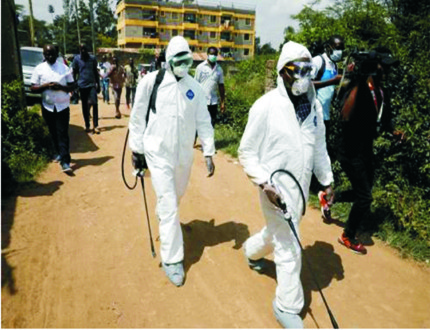Amidst growing inquiries by Nigerians on how the coronavirus relief fund is shared among citizens in the country, the Federal Government has come out to say that it relied on already existing register of 2016 to distribute the money to the poorest and vulnerable people in the country.
This is even it has said it would
henceforth work with state governments to reach out to beneficiaries of its
palliatives arranged to assuage the harsh effects of the pandemic.
The Minister of Humanitarian Affairs, Disaster Management and Social
Development, Mrs Sadiya Umar-Farouk, made this disclosure during the daily
briefing of the task force.
Responding to a question on whether the Federal Government was thinking of
changing the strategy of sharing the palliatives, owing to criticism from
quarters, the minister said the country had a national response plan on ground,
with representatives from the national to local government on board.
She said all tiers of government were represented in the committee that had
been distributing relief materials to the vulnerable.
“Going forward, we have decided to handover this food relief to the state
governors for onward redistribution to their citizens, the poor and vulnerable
in the society. In fact, I have started that. I was in Lagos last week and Ogun
states and I have handed over trucks of food relief to these governors.
“So far, we have reached out to the three affected states that have been locked
down by the federal government, the two states plus the FCT. Also, we have
deployed some food relief to two south-eastern states of Imo and Ebonyi
specifically”, she said.
On the disbursement of cash to the poor and vulnerable, the minister said, “I
have mentioned it before that this is an approval that has been in existence
since 2016 and we are using the existing register. We will give them N5,000 per
month but now that Mr. President has directed that we give two months advance,
that is why we are giving this N20,000. Yes, it is a process that is really
cumbersome, but with transparency and accountability the ministry has already
begun the digitalization of this process.
“We have four pilot states that are on digital payroll so far and we are
continuing with that. We hope that in our next month payment we will be able
to, at least, have all the states adopt digital payment. It is not a one day
off thing, it takes a process. And we are using mobile phones, wallets because
the BVN of these beneficiaries exist but it is not all of them that are on the
banking system. So, we are looking at all these issues”, she explained.
On the possible expansion of the register, Farouk said “yes, I did mention that
we are working on the possible expansion of the register and this is to inform
you that we have started the process. Our main focus now is going to be on the
urban poor because these are the people that have now become vulnerable as a
result of the COVID-19 pandemic and the lockdown.
“We are also focusing on people living with disabilities. Already we have some
numbers in our existing sub-national social register but now we are going to
focus more in registering these people with special needs”, she said

